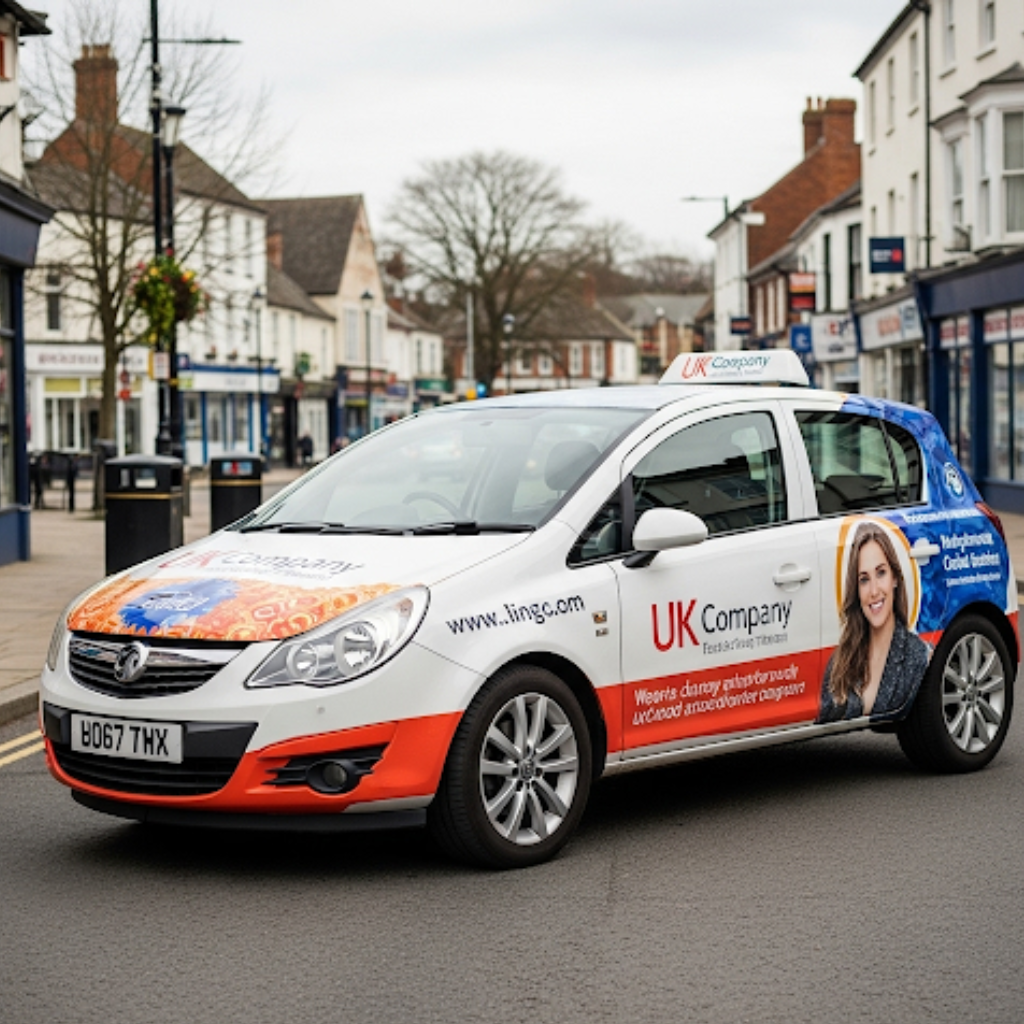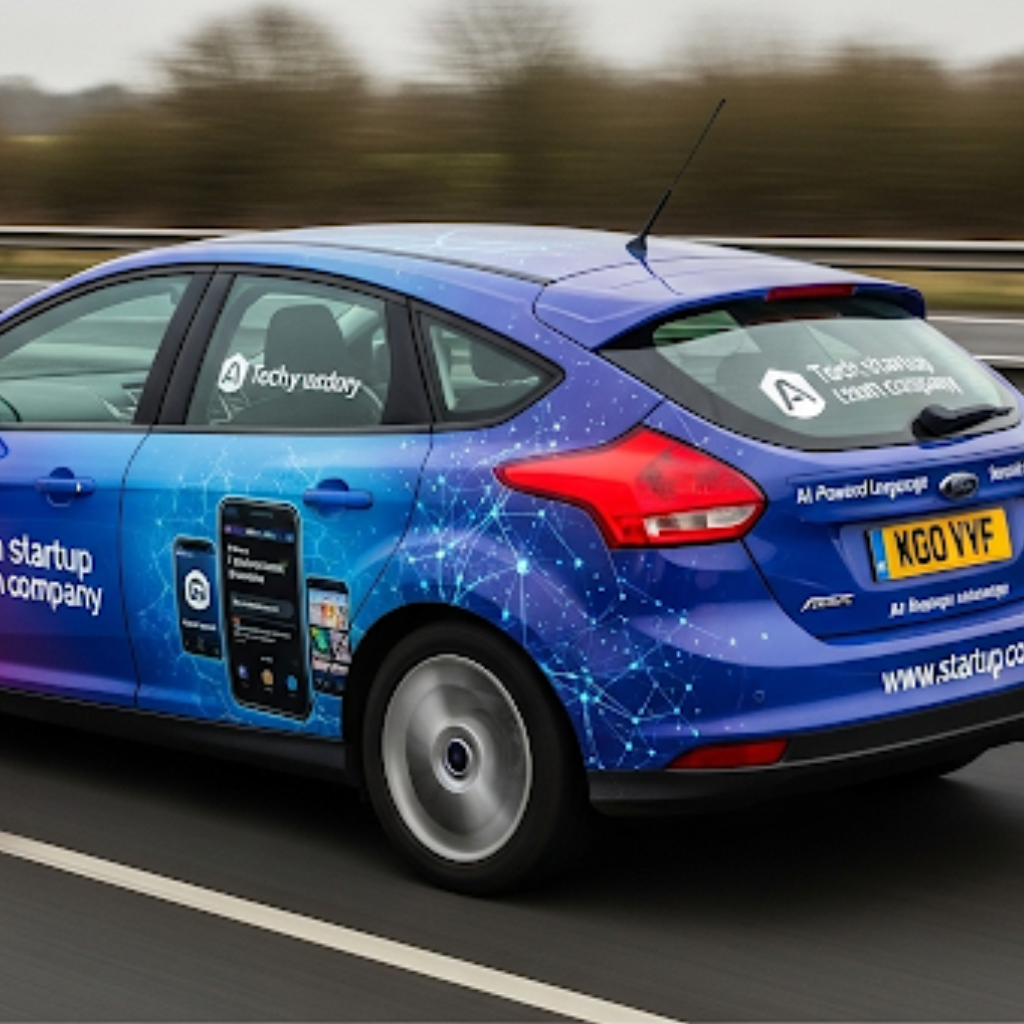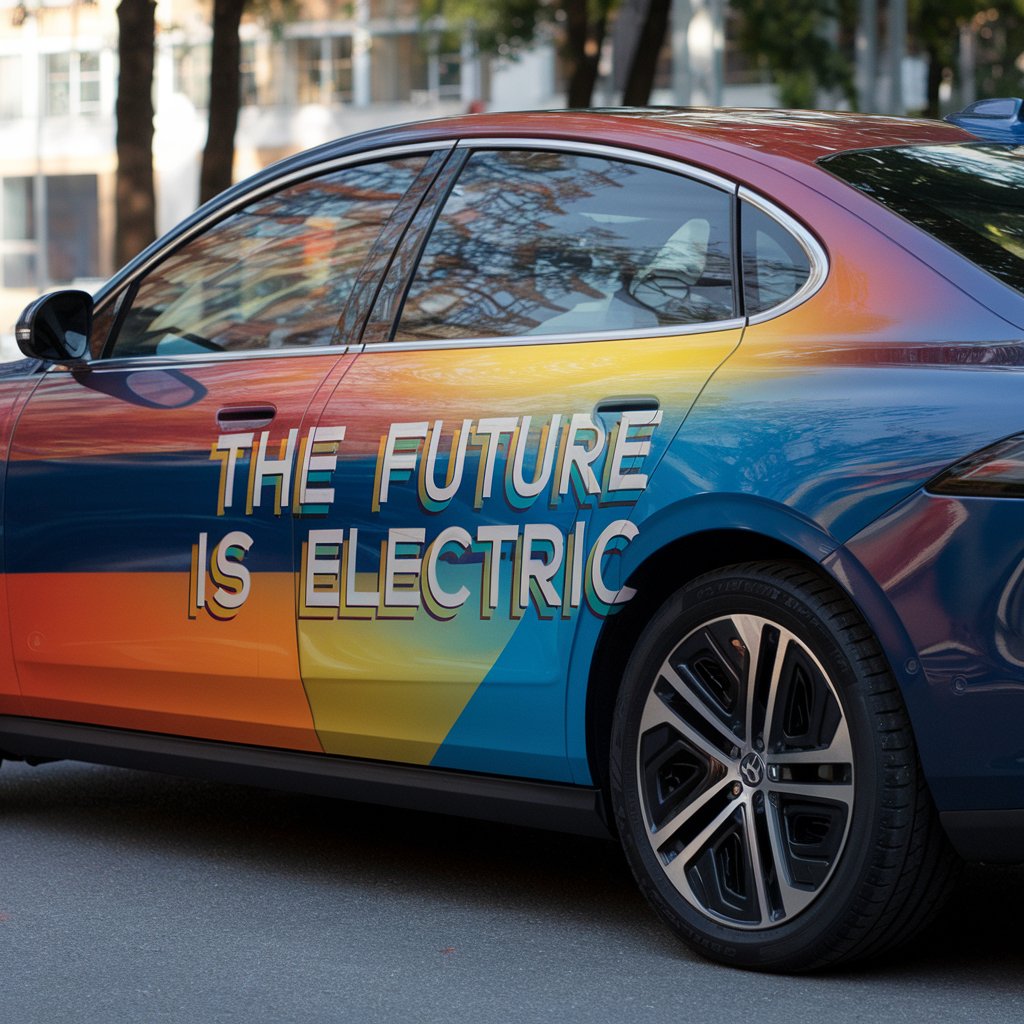The cost to wrap a car with a high-quality car wrap in the UK typically ranges from £1,200* to £3,500*. Costs depend on vehicle size, material quality, and design complexity. High-quality vinyl wraps are generally more economical than extensive paint jobs, offering protection and aesthetic enhancement. Full wraps are pricier than partial ones, and van wraps cost more due to larger surfaces. To understand the factors influencing these costs, a further exploration into specific options and considerations is encouraged.
Key Takeaways
- High-quality car wraps typically cost between £1,200* and £3,500*, depending on factors like vehicle size and design complexity.
- Premium materials such as chrome or carbon fibre can significantly increase the overall cost of a car wrap.
- Professional installation is crucial for durability and visual appeal, influencing the total cost.
- Car wraps are cheaper than high-quality paint jobs, offering customisation and protection.
- Quality wraps last 5-7 years, providing a cost-effective alternative to maintaining a car’s appearance.
What’s the Average Cost to Get a Car Wrap in the UK Today?
In the UK, the average cost of a car wrap ranges from £1,200* to £3,500*, contingent on factors such as vehicle size, material, and car wrap design complexity.
When comparing costs, wrapping is often more economical than a complete vehicle respray. It provides an attractive option for those seeking to preserve their car’s original paint while achieving a customised appearance.
Industry experts emphasise that the choice between wrapping and painting should consider the vehicle’s intended use and the desired longevity of the finish.
What’s the Average Cost to Get a Car Wrap in the UK Today?
How much should one expect to pay for a car wrap in the UK today? The cost of a car wrap largely hinges on factors such as vehicle size, type of wrap (full or partial), and the quality of vinyl materials used.
On average, a high-quality full wrap in the UK ranges from £1,200* to £3,500*. For a partial wrap, costs typically span £500* to £1,500*. The choice of wrap provider and expertise in wrap installation greatly influences the final cost.
Premium high-quality vinyl is crucial for durability and finish, impacting the overall expense. Therefore, obtaining quotes from reputable providers while considering these variables guarantees a thorough understanding of the UK average cost for car wraps.

Is It Cheaper to Wrap or Paint a Car in the UK?
When evaluating whether to wrap or paint a car in the UK, several factors must be considered, including cost, longevity, and aesthetics.
The car wrap cost is influenced by the complexity of the vehicle and the quality wrap chosen. Generally, the cost to wrap a car with vinyl wrap ranges from £1,000* to £3,000*.
Conversely, a standard paint job can range from £1,500* to £5,000*. Car wrap prices are often lower than high-quality paint jobs, making it potentially cheaper to wrap or paint a car, depending on quality preferences and budget constraints.
Additionally, vinyl wraps offer short-term flexibility and protection, while paint jobs provide long-term durability.
Ultimately, the decision hinges on individual priorities and the specific costs in the UK market.
Is a High-Quality Vinyl Car Wrap Worth the Cost in the UK?
When considering the investment in a high-quality vinyl car wrap in the UK, several factors must be evaluated, such as longevity compared to traditional paint jobs.
The lifespan of a car wrap, which can often exceed five years, is influenced by the quality of the material, with premium options typically offering better durability and resistance to environmental factors.
Additionally, the cost varies considerably depending on vehicle size and the chosen wrap type, making it essential to assess whether the benefits align with the financial outlay.
How Much Does a Car Wrap Last Compared to Paint Jobs?
In evaluating the longevity of car wraps versus traditional paint jobs, it is crucial to contemplate both durability and aesthetic retention over time.
A typical car wrap, when executed with quality vinyl wrap material, can last between 5 to 7 years. This is contingent on factors such as the complexity of your vehicle and the quality of the vinyl used.
Comparatively, paint jobs can last longer, often over a decade, but they may require more frequent touch-ups to maintain their appearance.
The cost of wrapping a car with high-quality materials might initially seem higher, yet it provides a protective layer against environmental elements.
Fully wrapping a vehicle can be a cost-effective alternative to painting a car, offering customisation and potentially preserving resale value.
What Type of Wrap Material Impacts Car Wrapping Costs Most?
The choice of wrap material greatly influences the overall cost of car wrapping, with high-quality vinyl being a pivotal factor.
Vinyl wrap options, such as gloss and matte, carbon fibre, chrome, and matte black, vary considerably in price. The quality of the vinyl, determined by its durability and finish, directly affects the cost of car wrapping.
High-end materials like chrome wrap offer a unique appearance but demand a premium price. Conversely, matte black and effect vinyl provide a distinct look at a comparatively lower cost.
The type of wrap selected not only impacts the aesthetic appeal but also the longevity of the wrap, making high-quality vinyl a worthwhile investment in the UK market for those seeking both style and durability.
How Do Vehicle Size and Wrap Type Affect Car Wrap Prices?
Although various factors contribute to car wrap pricing, vehicle size and wrap type stand out as significant determinants.
The vehicle size directly influences car wrapping costs, as larger vehicles require more material and labour, increasing the price of a full wrap.
Furthermore, the wrap type—whether a full or half wrap also impacts the price. A full wrap covers the whole vehicle surface, whereas a partial wrap is applied only to selected sections, making the latter more cost-effective.
Additionally, the quality of vinyl chosen plays an essential role; higher-end materials enhance durability and appearance, but also elevate costs.
Ultimately, the cost might vary based on the wrap, depending on these factors, balancing between aesthetic appeal and budget constraints in the UK market.
Which Costs More: A Full or Partial Wrap on a Car?
When comparing the cost of full versus partial vinyl wraps, several factors must be considered, including the quality of vinyl and the complexity of the installation.
Higher-grade vinyl typically results in increased costs but offers enhanced durability and finish, impacting the overall investment.
In addition, the skill level of the installer plays a significant role in determining the final price, as expertise in application can affect both the quality and longevity of the wrap.
This makes it vital for consumers to weigh these elements when deciding between full or partial wraps.
What Are the Differences in Vinyl Quality and Wrap Costs?
While evaluating the cost of car wraps, understanding the differences in vinyl quality is crucial for both budget planning and achieving the desired aesthetic outcome.
The quality of the vinyl wrap greatly influences wrap costs, with high-quality wraps typically commanding a premium due to superior durability and finish.
Factors contributing to the cost range include:
- Material Used: Premium vinyl materials offer enhanced UV protection and longer lifespan, affecting overall vehicle wrap costs.
- Vinyl Quality: Higher-grade vinyl guarantees better adhesion and reduced likelihood of peeling or bubbling, providing a more professional look.
- Cost Range: Prices can vary from economical basic wraps to expensive high-quality wraps, depending on the desired finish and longevity.
Grasping these factors enables consumers to make well-informed choices when investing in car wraps.
How Does Installer Skill Impact Car Wrap Cost in the UK?
Installer skill greatly influences car wrap costs in the UK, as the expertise of the installer directly affects both the quality and longevity of the wrap.
A highly skilled installer guarantees precise application, minimising the risk of bubbles or misalignment, which can lead to increased durability and aesthetic appeal. Skilled professionals typically command higher fees due to their ability to deliver superior results, thereby impacting overall wrapping costs.
Conversely, less experienced installers may charge lower rates, but the potential for errors can compromise the vinyl’s performance and lead to costly reapplications.
Consequently, when considering a car wrap, the skill level of the installer is a critical factor, influencing not only the initial cost but also the long-term value and appearance of the car wrap.

Is It Worth Wrapping Your Car with Premium Vinyl Wrap?
Why consider premium vinyl wrap for your vehicle? It offers an aesthetic upgrade and protects the original paintwork.
The decision to wrap a car with high-quality vinyl involves evaluating several factors:
- Cost Range: A full car wrap is generally more expensive than a partial wrap, with prices influenced by vehicle size, complexity, and material choice.
- Durability: Premium vinyl wraps offer superior longevity and resistance to wear compared to standard wraps, making them worth the investment if long-term appearance and protection are priorities.
- Comparison with Paintwork: When analysing car wrap vs paintwork, wraps provide flexibility in design and are often reversible without affecting the underlying paint.
Ultimately, the cost to wrap your car should be weighed against these factors to determine if a premium vinyl wrap is a worthy investment.
Why Do Van Wrap Prices Differ from Car Wrap Costs in the UK?
Van wrap prices in the UK differ from car wraps primarily due to the larger surface area and more complex contours involved in wrapping a van.
While a partial van wrap can be more cost-effective than a full wrap, the choice between the two depends on the desired coverage and marketing impact.
Additionally, when considering long-term value, wrapping a van may offer more flexibility and maintain resale value compared to traditional painting.
What’s the Cost Difference Between a Van Wrap and a Car Wrap?
The cost disparity between van wraps and car wraps in the UK can be attributed to several factors inherent to the vehicles’ design and dimensions.
The size of the vehicle is a primary determinant. A van wrap typically covers a larger surface area than a car wrap, leading to increased material and labour costs.
Full car wrap costs may range between £300* and £2,000*, while wrapping a whole vehicle like a van can cost between £1,200* and £3,500*. The cost between £300* and higher figures reflects factors influencing car wrap costs, including vehicle contours, surface preparation, design complexity, and the type of vinyl used.
The complexity of the vinyl wrap car application also plays a key role in determining the final price.
- Size and Surface Area: A Larger surface area for van wraps increases material and labour expenses.
- Complexity of Application: More intricate designs and detailing elevate costs.
- Market Demand: Fluctuations in demand impact average cost in the UK.
How Does a Partial Van Wrap Compare in Cost to a Full Wrap?
When comparing the costs of partial and full van wraps, it becomes evident that the extent of coverage greatly influences the overall pricing. A partial van wrap, covering key areas such as doors or rear panels, generally incurs lower costs compared to a full wrap of the whole car.
The cost can range markedly, influenced by the quality of the vinyl wrap, such as opting for a matte finish or a more durable material. In the UK, these cost differences are more pronounced due to varying bodywork sizes between vans and cars.
While a full wrap offers complete visual transformation, a partial wrap can serve as a cost-effective solution, especially when using cheap vinyl without compromising desired aesthetics.
Is It Better to Wrap or Paint a Van for Long-Term Value?
How should one decide between wrapping or painting a van for long-term value? Evaluating cost, longevity, and aesthetic preferences plays a vital role.
A high-quality vinyl wrap offers numerous advantages, particularly for commercial vans, due to its ability to protect underlying paintwork and enhance resale value. In contrast, a respray with gloss or metallic paintwork may provide a more traditional finish, but often at a higher cost with less flexibility for design changes.
- Cost Efficiency: Vinyl wraps are generally more cost-effective than high-quality resprays.
- Durability: Wraps can last 5-7 years, preserving the original paint underneath.
- Customisation: Vinyl offers diverse options for colours and finishes, including gloss and metallic.
Van wrap costs differ from car wraps due to larger surface areas and complexity.
Does Car Wrap Cost Depend on Vinyl Material and Wrap Type?
The cost of car wraps is considerably influenced by the quality of vinyl material and the type of wrap chosen, impacting both durability and aesthetic appeal.
Investing in high-quality vinyl offers benefits such as a longer lifespan and superior finish, which can justify the higher initial expense, especially since premium vinyl will last significantly longer under varying weather conditions.
Opting for cheaper alternatives may cost less upfront, but can result in premature wear and tear. In many cases, a complete vehicle wrapped with lower-grade vinyl may require early replacement, leading to added expenses over time.
A professional-grade vinyl wrap typically costs around £1,200* to £3,000*, depending on the vehicle size and complexity, making the choice of material and wrap type a critical consideration for consumers prioritising long-term value.
What Makes the Cost to Wrap a Car Worth the Investment?
As vehicle owners consider the financial implications of a car wrap, understanding the factors contributing to its cost is essential for evaluating the investment’s worth.
A high-quality vinyl wrap offers significant benefits that can justify its cost per square foot.
- Durability and Protection: A quality car wrap provides a protective layer that safeguards the vehicle’s original paint against scratches, UV exposure, and minor surface damage, thereby preserving its resale value.
- Professional Installation: Ensuring a seamless application, professional installation enhances the wrap’s longevity and visual appeal, reducing the risk of peeling or bubbling.
- Customisation and Aesthetics: Vinyl wraps offer unlimited design possibilities, enabling vehicle owners to personalise their cars with unique colours and finishes, enhancing their aesthetic appeal.
Evaluating these factors can help determine the wrap’s actual value.
Why Choose a Quality Vinyl Wrap Over a Cheap Alternative?
When selecting a car wrap, prioritising quality over cost can lead to more durable and visually appealing results. High-quality car wraps often outperform their cheaper alternatives regarding durability and appearance, making them a wise investment. Quality vinyl is engineered to withstand environmental factors, reducing the need for frequent replacements and lowering the long-term cost of wrapping a car. While a cheap alternative may initially seem cost-effective, it can compromise the aesthetic and longevity of the car wrapping.
| Aspect | High-Quality Vinyl Wrap |
|---|---|
| Durability | Long-lasting, resistant to wear |
| Appearance | Consistent, vibrant colours |
| Initial Cost | Higher investment |
| Long-Term Value | Cost-effective over time |
This analysis underscores the benefits of opting for quality when deciding to wrap your car.

Conclusion
To summarise, the cost of wrapping a car in the UK varies considerably based on several factors, including the extent of the wrap, the type and quality of vinyl used, and whether the vehicle is a car or van. While high-quality vinyl wraps entail a higher initial investment, the durability and visual appeal often make the expense worthwhile. In the end, individuals should evaluate their specific needs and budget to choose the most practical and cost-effective wrapping option.
*For accurate pricing, please call and confirm with Magenta Signs.


